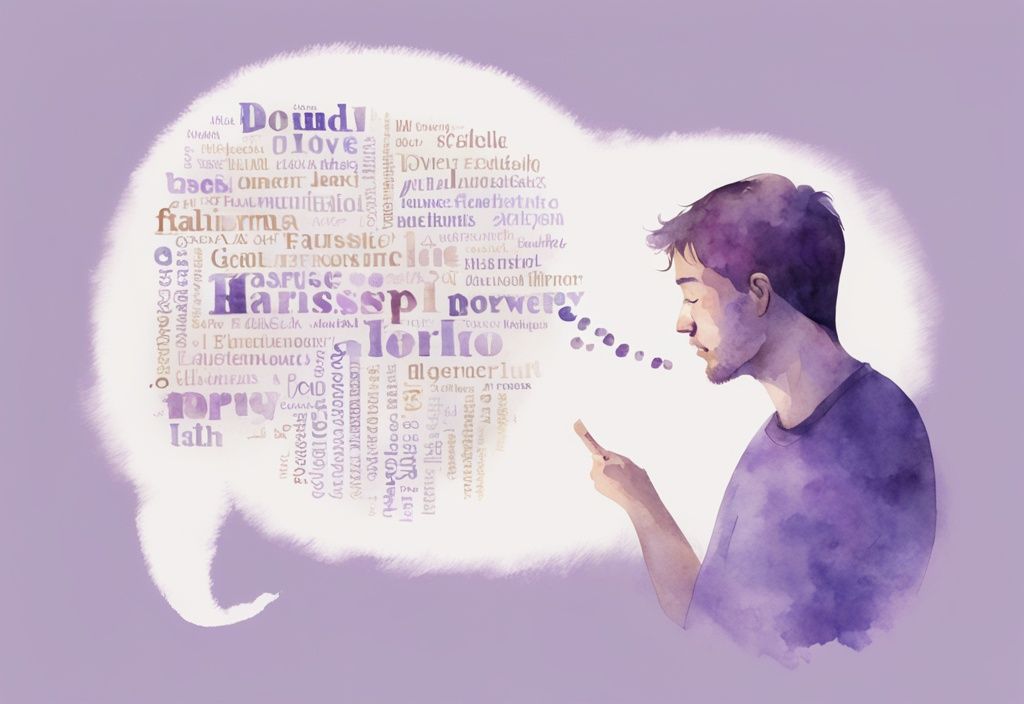Understanding Narcissistic Devaluation: Symptoms and Coping Strategies
Ever found yourself questioning your own sanity after significantly damaging interactions? This could be the work of narcissistic devaluation, an insidious, emotional abuse designed to control and undermine one’s self-worth. As someone who has experienced this firsthand and holds an extensive background in psychology, I pledge to empower you with key insights into this perplexing dynamic.
By forging ahead with this article, you’ll unveil the profound depths of narcissistic abuse, discern its? phases, and more importantly, learn effective coping strategies. Whether you’re grappling with a narcissistic partner, family member or colleague, this knowledge is a pivotal step towards your healing journey.
Embark on this enlightening voyage to discover predictable patterns, mental impacts, and actionable steps to regain your life. This voyage will make you feel less alone, more understood, and ultimately, stronger than ever.
What is Narcissistic Devaluation?
Narcissistic devaluation is a complex and often bewildering experience, especially for those caught in its grasp. Here, we’ll delve into what this term means and how it manifests in the context of narcissistic personality disorder (NPD). By understanding this dynamic, you can start to recognize its signs and learn how to protect yourself from its harmful effects.
Definition and Overview
Narcissistic devaluation is a psychological mechanism often used by individuals with narcissistic personality disorder (NPD) to deflect their own feelings of inadequacy or threat.
During this process, the narcissist systematically undermines another person, thereby maintaining a semblance of control and preserving their fragile self-esteem. Imagine it as a toxic dance where one partner is constantly belittling the other to keep themselves feeling superior.
Devaluation is a key phase in the cycle of narcissistic abuse. It typically follows an initial period of idealization when the narcissist places their victim on a pedestal. But once the victim starts to disappoint the narcissist’s unrealistic expectations, the devaluation begins.
You might experience this phase through relentless criticism, belittling comments, and manipulative actions designed to destabilize you emotionally.
Role in Narcissistic Personality Disorder
In the context of narcissistic personality disorder, devaluation serves a crucial function. It acts as a shield, protecting the narcissist’s inflated self-image by projecting their own insecurities onto others.
This mechanism allows narcissists to avoid facing their own vulnerabilities. Imagine a person who sees themselves in a broken mirror—by breaking others, they believe they can mend their own shattered reflection.
Narcissists often oscillate between idealizing and devaluing others, a behavioral pattern that helps them maintain emotional and psychological control over their relationships.
Unfortunately, this see-saw action deeply impacts their victims, eroding self-esteem and creating a pervasive sense of emotional instability and distress.
As you navigate these challenges, remember that recognizing these patterns is the first step toward reclaiming your sense of self and finding healthier, more supportive relationships.
The Narcissistic Abuse Cycle
The narcissistic abuse cycle is a manipulative process designed to exert control and instill dependency. It consists of three main phases: Idealization, Devaluation, and Discard, followed by Hoovering.
Each phase plays a crucial role in the destabilizing and emotionally damaging experience of narcissistic abuse.
Idealization Phase
- Imagine being placed on a pedestal, showered with praise and attention. This idealization creates an illusion of a perfect relationship crafted meticulously by the narcissist.
- Such overwhelming affection leads to a euphoric state, deepening your dependency on their approval. It’s a powerful tool that makes you feel uniquely valued and loved.
- However, this foundation of adoration is a setup. When the narcissist shifts to devaluation, the emotional blow is devastating and deeply manipulative.
Devaluation Phase
- Gradually, the enchantment fades. Subtle criticisms and insults start chipping away at your self-esteem, leaving you questioning your worth.
- Gaslighting becomes frequent. The narcissist manipulates you to the point where you doubt your own memories and perceptions, making reality feel elusive.
- Control is asserted through emotional abuse—threats, ultimatums, and blackmail become common tactics to instill fear and compliance.
- Blame-shifting and projection are constant. The narcissist faults you for their shortcomings, eroding your confidence and stability even further.
Discard Phase and Hoovering
- The discard phase hits hard. Abrupt withdrawal of affection and attention leaves you feeling abandoned, confused, and emotionally devastated.
- Hoovering re-enters the picture. The narcissist might use charm or feigned remorse to lure you back, perpetuating the painful cycle.
- This cycle, repetitive and relentless, creates trauma bonds. Breaking free and fully detaching becomes an excruciatingly difficult challenge.
Types of Devaluation in Different Relationships
Understanding the multifaceted ways narcissistic devaluation manifests in various relationships can provide perspective and validation. These dynamics, whether in personal, familial, or professional settings, share common threads of emotional manipulation, control, and harm, leaving lasting impacts on victims.

Intimate Relationships
- Narcissistic devaluation in romantic relationships often includes emotional withdrawal, manipulative tactics, and cheating.
- The narcissist might employ verbal abuse, threats of abandonment, and withhold affection as forms of punishment.
- This dynamic creates a continuous cycle of emotional highs and lows, keeping the victim off-balance and dependent on the narcissist’s approval.
- The victim may experience a significant erosion of self-esteem and develop anxiety due to constant emotional manipulation.
Family Dynamics
- Within families, narcissistic devaluation can emerge as favoritism, scapegoating, and excessive control.
- Siblings, children, or even parents may be subjected to ongoing criticism and emotional manipulation.
- Favoritism and scapegoating can create a toxic family environment, leading to long-term psychological issues for the less favored family members.
- Victims often struggle with feelings of inadequacy and seek validation, perpetuating the cycle of control exerted by the narcissist.
Workplace Relationships
- In professional settings, narcissistic bosses or colleagues may resort to undermining, delivering backhanded compliments, and engaging in professional sabotage.
- This behavior fosters a toxic work environment, resulting in job dissatisfaction and impacting mental health.
- Narcissistic devaluation in the workplace can suppress career advancement opportunities for the victim, leading to frustration and diminished professional self-worth.
- Victims may find themselves doubting their professional skills and contributions, feeding into the narcissist’s agenda of maintaining control and superiority.
Early Warning Signs and Indicators of Devaluation
Devaluation within narcissistic relationships often starts subtly but gains momentum over time, wearing down the victim’s self-esteem and sense of reality.
Subtle Criticisms and Passive-Aggressiveness
- Devaluation often starts with minor criticisms. These tiny, seemingly insignificant remarks can gradually intensify over time, slowly eroding your confidence. It’s like water dripping on a stone – insignificant at first, but eventually wearing it down.
- Passive-aggressive remarks and backhanded compliments are frequently employed. These indirect insults pretend to be civil on the surface but are designed to undermine your self-esteem. Imagine a dagger wrapped in silk – it’s still painful, just hidden beneath a veneer of politeness.
Gaslighting and Mind Games
- Gaslighting is a powerful tool in narcissistic devaluation, crafted to make you question your own memories and perceptions. This manipulation distorts your reality, creating a cloud of confusion and self-doubt. It’s like being lost in a hall of mirrors where every reflection is slightly twisted.
- Narcissists are experts at creating no-win scenarios. No matter what you do, it’s wrong, with the blame constantly shifting to keep you off-balance and feeling inadequate. It’s like playing a game where the rules change just when you think you’ve got them figured out.
Verbal Devaluation: Insults and Name-Calling
- Narcissists often weaponize language, using derogatory terms and hurtful nicknames that target your insecurities, inflicting deep emotional wounds. These abuses may start subtly but can become overt as devaluation progresses, striking at the core of your self-worth.
- Subtle verbal abuse is often disguised as jokes or sarcasm. But it constantly seeks to belittle and demean, chipping away at your self-esteem. Imagine a constant undercurrent of negativity, slowly but surely pulling you under.
Emotional Abuse: Threats and Ultimatums
- Narcissists wield threats, such as the threat of abandonment or punishment, as tools to control your behavior. This keeps you in a perpetual state of fear and compliance, like a puppet on strings, always under the threat of having them cut.
- Ultimatums are a common tactic; they present you with false choices, forcing you into compliance by making it seem like there are no other viable options. It’s a false dichotomy, trapping you in an illusion of choice.
Psychological and Emotional Impact on Victims
Understanding the psychological and emotional toll of narcissistic devaluation is crucial for grasping its pervasive effects on victims. This section delves into how such toxic dynamics can dismantle self-esteem, impact mental health, foster trauma bonding, and create codependency.
Effects on Self-Esteem and Self-Worth
Long-term exposure to narcissistic devaluation significantly erodes a victim’s confidence and self-respect. Often, victims internalize the negative messages propagated by the narcissist, mistakenly believing they deserve the abuse. This internalization can create persistent self-doubt, making it difficult for victims to trust their own judgments and decisions.
Ultimately, this eroded self-esteem can lead to a host of other personal and professional challenges, including isolation and underperformance.
Mental Health Consequences: Anxiety and Depression
Narcissistic devaluation often results in chronic anxiety and depression, leaving victims in a perpetual state of distress. Continuous emotional trauma can escalate into severe mental health conditions like PTSD or Complex PTSD (C-PTSD).
The constant stress and negativity foster a harmful mental environment, making recovery more challenging without proper support and intervention. Victims may also develop coping mechanisms such as dissociation or numbing, further complicating their mental health landscape.

Trauma Bonding and Its Role
Trauma bonding keeps victims emotionally tethered to the narcissist through cycles of manipulation, reward, and punishment. Victims often find themselves rationalizing the abuse, fantasizing about returning to the initial idealization phase when things seemed perfect. This toxic attachment fosters a cycle where victims endure increasing levels of abuse, hoping for intermittent positive reinforcement.
Breaking free from this bond requires a deep understanding of the psychological mechanisms at play and dedicated efforts toward self-healing.
Understanding Codependency
Codependency in the context of narcissistic devaluation involves an excessive emotional or psychological reliance on the narcissist. Both the victim and the narcissist seek external validation, creating a dysfunctional and co-dependent relationship cycle.
Victims may sacrifice their own needs and boundaries, prioritizing the stability and approval of the narcissist over their well-being. This dynamic perpetuates a cycle of abuse and control, making it crucial for victims to recognize and address their codependent tendencies through therapeutic interventions.
Coping Strategies and Protective Measures
Setting and Maintaining Boundaries
Establishing and maintaining clear, non-negotiable boundaries is essential when dealing with narcissistic devaluation. Imagine your boundaries as the walls of a safe haven, designed to protect your emotional well-being. Define what behavior is acceptable and communicate these limits explicitly. Consistent enforcement of these boundaries ensures they are respected. Use assertive communication techniques to guard your emotional space. Remember, setting limits is a powerful form of self-care and an effective way to shield yourself from further emotional harm.
Building a Support Network
Cultivating a strong support network is crucial for emotional resilience. Picture this network as a sturdy lifeline composed of friends, family, and support groups who truly understand the dynamics of narcissistic abuse. These relationships offer much-needed emotional assistance and validation, helping you feel less isolated. Engage with empathetic communities, both online and offline, sharing similar experiences. A solid support network provides practical advice and reinforces your sense of self-worth, acting as a buffer against the isolating effects of narcissistic devaluation.
Maintaining Financial Independence
Ensuring personal financial stability is a key strategy to avoid economic dependency on a narcissist. Your financial autonomy can significantly diminish the control a narcissist might exert over you. If you’re in a relationship with a narcissist, consider separating your finances to minimize their influence. Maintain your own bank account and build an emergency fund to secure your financial independence. This preparation ensures you have options in crises, empowering you to make decisions free from financial manipulation.
Keeping Records and Documentation
Documenting instances of abuse is a vital protective measure. Keep detailed records of each occurrence, noting dates, times, and specific behaviors. Save and organize communications, such as texts or emails, as these can serve as evidence when needed. This documentation is invaluable for legal proceedings or when seeking professional help. Keeping thorough records also helps affirm your experience, countering the distortive effects of gaslighting and manipulation commonly associated with narcissistic devaluation.
Healing and Recovery from Narcissistic Devaluation
The journey to healing from narcissistic devaluation is multifaceted, involving restoring self-worth, therapeutic interventions, cultivating self-care, and increasing awareness. Each step is essential for rebuilding an empowered and resilient identity.
Strengthening Inner Identity and Self-Worth
- Engage in practices that build self-esteem and affirm personal value. Regularly reminding yourself of your strengths and achievements can bolster your self-worth.
- Seek hobbies and interests that reinforce a sense of accomplishment and identity. Activities like painting, writing, or sports not only provide a creative outlet but also help in rediscovering your passions and talents.
- Use positive affirmations and self-compassion exercises to mitigate the negative self-talk implanted by narcissistic devaluation. Reinforce your worth by celebrating small victories and progress.
Therapeutic Interventions: CBT, Trauma-Informed Therapy, and DBT
- Cognitive-behavioral therapy (CBT): This therapy focuses on identifying and reframing negative thought patterns, enabling you to develop a healthier outlook and coping mechanisms for dealing with narcissistic abuse.
- Trauma-informed therapy: Tailored for those with PTSD or C-PTSD, this approach helps in addressing the specific impacts of prolonged narcissistic devaluation, fostering a safe environment for healing.
- Dialectical behavior therapy (DBT): DBT enhances emotional regulation and interpersonal effectiveness, essential tools for navigating relationships post-abuse and establishing healthier boundaries.
- Consider group therapy or support groups as well, since sharing experiences with others who have faced similar challenges can offer validation and camaraderie.
Importance of Self-Care and Personal Resilience
- Prioritize self-care activities that nurture physical and emotional health. Regular exercise, balanced nutrition, and sufficient sleep are foundational for well-being.
- Develop resilience through mindfulness practices, such as meditation and deep-breathing exercises, which can enhance your emotional strength and stability.
- Engage in activities that you enjoy and bring you peace, such as reading, gardening, or taking long walks. These practices can serve as a refuge and help you process emotions safely.
Education and Awareness
- Educate yourself about narcissistic abuse and devaluation to recognize and understand the patterns. Knowledge is empowering and helps to dismantle the manipulations you might have endured.
- Read books, attend workshops, and engage with content that explores the dynamics of narcissistic relationships, enabling you to spot red flags early and maintain healthy interactions.
- Create or join awareness campaigns to share your knowledge and support others. Building a community around this understanding can provide additional layers of support and validation.
Recognizing and Preventing Narcissistic Devaluation
Understanding how to identify and guard against narcissistic devaluation is crucial in maintaining emotional well-being. The following sections offer practical advice on recognizing red flags and supporting those affected.
Trusting Your Intuition
Trusting your intuition can be a powerful tool in identifying narcissistic devaluation early on. When something feels off in a relationship, it’s often because it is. For instance, if you frequently feel on edge or nervous around a particular person, it’s essential to delve deeper into the reasons behind these emotions. This internal alarm system serves as your first line of defense.
Moreover, tuning into these gut instincts can alert you to subtle, often hidden, signs of abusive behavior. By identifying these early, you can take proactive steps to protect yourself, potentially averting more significant emotional harm. In recognizing these cues, you start to fortify your emotional boundaries.

Recognizing Red Flags
Understanding the red flags of narcissistic devaluation is a vital part of early detection and prevention. One significant indicator is excessive criticism. If compliments are rare and criticism is frequent, designed to erode your self-esteem, it’s a considerable warning sign.
Another telltale sign is a lack of accountability. Typically, narcissists refuse to admit fault and instead deflect blame onto others, perpetuating a cycle of manipulation. Manipulative behaviors like gaslighting and creating no-win scenarios are common tactics used to destabilize your sense of reality and autonomy.
Being aware of these signs empowers you to make informed decisions about whom you allow into your life, helping you avoid deeper entanglement with potentially harmful individuals.
Supporting Vulnerable Individuals
Offering a supportive and understanding environment for those enduring narcissistic abuse can significantly impact their journey toward recovery. Listening without judgment creates a safe space for them to share their experiences openly.
Encouraging them to seek professional help is vital. Provide them with resources such as hotlines, support groups, and mental health professionals specialized in narcissistic abuse. Your support plays a crucial role in helping them feel less isolated and more empowered to take steps toward healing and self-empowerment.
Conclusion
Narcissistic devaluation is a profoundly destructive psychological mechanism, employed by individuals with narcissistic tendencies in various relationships. Its devastating impact can leave victims grappling with diminished self-esteem, anxiety, depression, and in severe cases, PTSD or C-PTSD.
Understanding the intricate dynamics and cyclical nature of narcissistic abuse is paramount. Recognizing the signs of devaluation—subtle criticisms, passive-aggressive remarks, and other emotionally abusive tactics—allows individuals to identify and respond to these behaviors early.
Recovery from narcissistic devaluation isn’t just possible; it’s achievable with effective coping strategies. Establishing and maintaining strong boundaries is crucial for protecting oneself from ongoing emotional harm. Building a robust support network of friends, family, or support groups provides essential emotional and psychological reinforcement. Moreover, maintaining financial independence can help avoid economic entrapment.
Therapeutic interventions offer invaluable tools for healing. Cognitive Behavioral Therapy (CBT), trauma-informed therapy, and Dialectical Behavior Therapy (DBT) aid in rebuilding self-esteem and managing emotional distress. These therapies help reframe negative thought patterns, address trauma, and enhance emotional regulation and interpersonal effectiveness.
Self-care and fostering resilience are fundamental aspects of the healing process. Engaging in activities that promote physical and emotional well-being, such as mindfulness practices, regular exercise, and maintaining healthy routines, significantly contributes to recovery.
Educating oneself about narcissistic devaluation and the broader spectrum of narcissistic abuse equips individuals with the knowledge to recognize these harmful patterns. This understanding empowers both prevention and effective recovery.
Integrating these coping mechanisms and seeking appropriate therapeutic support can help you heal and reclaim your sense of self-worth and emotional stability.
FAQ
What are the main signs of narcissistic devaluation?
- Subtle criticisms that chip away at your self-esteem
- Passive-aggressive behavior that leaves you questioning yourself
- Gaslighting that distorts your sense of reality
- Verbal insults that undermine your confidence
- Emotional abuse, including threats and ultimatums, that creates a sense of fear
How can I protect myself from a narcissist’s devaluation tactics?
Establishing and maintaining strong boundaries is crucial. It’s about knowing your limits and sticking to them, even when it’s tough. Building a reliable support network of friends and family can provide the emotional backing you need. Staying financially independent is another protective measure, helping you feel secure and less controlled. Lastly, document any abusive behavior—keeping records can be empowering and serve as evidence if needed.
What are the long-term effects of being devalued by a narcissist?
The scars of narcissistic devaluation run deep. You might find yourself battling lowered self-esteem, where self-doubt becomes a constant shadow. Chronic anxiety and depression often accompany this experience, making each day a struggle. Many survivors develop PTSD or C-PTSD, plagued by flashbacks and emotional turmoil. Trauma bonds, a deep and painful connection to the abuser, can linger, complicating the healing process.
What are some effective strategies for healing after experiencing narcissistic devaluation?
Healing is a journey that starts with strengthening your inner identity. Engage in therapeutic interventions such as cognitive-behavioral therapy (CBT) or trauma-informed therapy, which offer tools and strategies for recovery. Prioritize self-care—nurture your body and mind through activities that bring you peace and joy. Seek education and awareness about narcissistic abuse; understanding what happened can be incredibly liberating and empowering.
Can professional therapy help in recovering from narcissistic abuse?
Absolutely. Professional therapy can be a beacon of hope. Therapies like CBT, trauma-informed therapy, and dialectical behavior therapy (DBT) provide invaluable tools for rebuilding self-esteem and coping with emotional trauma. These therapeutic approaches help you regain a sense of control and navigate the complex emotions that arise from narcissistic abuse.














Post Comment